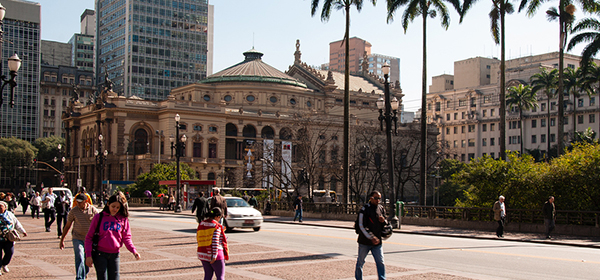Pros & Cons of Living in Sao Paulo
Summary: If you're considering a move to Sao Paulo, this article discusses the pros and cons of living in Sao Paulo.

Thinking about moving to Sao Paulo? Below we highlight some of the pros and cons of living in Sao Paulo.
As the largest city in Brazil and the Southern Hemisphere, Sao Paulo is a bustling metropolis that offers a unique blend of cultural diversity, vibrant nightlife, and a rich history. However, like any other city, living in Sao Paulo comes with its own set of advantages and disadvantages. This article aims to provide an in-depth look at the pros and cons of living in this dynamic city, offering insights from the perspective of both locals and expats.
Pros of Living in Sao Paulo
One of the most significant advantages of living in Sao Paulo is the city's cultural diversity. Sao Paulo is home to people from various ethnic backgrounds, including Italians, Japanese, Arabs, and Germans. This multiculturalism is reflected in the city's food, music, and festivals. For instance, the city hosts the world's largest Japanese festival outside Japan, the Festival do Japão, which showcases Japanese culture, food, and arts.
Another advantage of living in Sao Paulo is the city's vibrant arts and entertainment scene. Sao Paulo is home to numerous museums, art galleries, and theaters. The Sao Paulo Museum of Art, for instance, houses one of the most significant collections of European art in Latin America. The city also hosts the Sao Paulo International Film Festival, one of the most important film festivals in Latin America.
Sao Paulo also offers numerous opportunities for outdoor activities. The city's parks, such as the Ibirapuera Park and the Botanical Garden of Sao Paulo, provide residents with a respite from the city's hustle and bustle. The city is also close to beautiful beaches and mountains, making it an ideal base for weekend getaways.
Furthermore, Sao Paulo is a major economic hub, offering numerous job opportunities in various sectors, including finance, IT, and manufacturing. Many multinational companies have their regional headquarters in Sao Paulo, making it an attractive destination for expats seeking career advancement.
Lastly, Sao Paulo offers a high standard of living. The city has a well-developed infrastructure, with an extensive public transportation system and numerous shopping centers, restaurants, and bars. The city's healthcare system is also highly regarded, with many hospitals and clinics offering high-quality medical services.
Cons of Living in Sao Paulo, Brazil
Despite its many advantages, living in Sao Paulo also has its downsides. One of the most significant challenges is the city's high cost of living. Housing, in particular, can be quite expensive, especially in the city's more affluent neighborhoods. The cost of goods and services is also relatively high compared to other Brazilian cities.
Another major concern is the city's traffic congestion. Sao Paulo is notorious for its traffic jams, which can make commuting a stressful experience. The city's public transportation system, while extensive, can be overcrowded during peak hours.
Sao Paulo also struggles with environmental issues. The city's rapid urbanization has led to significant air and water pollution. The city's green spaces are also under threat from development, reducing the city's overall livability.
Crime is another significant concern in Sao Paulo. While the city's crime rate has decreased in recent years, it remains relatively high compared to other Brazilian cities. Violent crimes, such as robbery and assault, are particularly prevalent in certain areas of the city.
Lastly, while Sao Paulo's cultural diversity is one of its strengths, it can also lead to social tensions. The city's wealth disparity is stark, with affluent neighborhoods existing alongside impoverished favelas. This inequality can lead to social unrest and contribute to the city's crime rate.
In conclusion, Sao Paulo is a city of contrasts, offering a rich cultural experience and numerous opportunities, but also presenting significant challenges. Whether the pros outweigh the cons will largely depend on individual circumstances and priorities.
 Oliveira Lawyers
Oliveira LawyersGet Quote
Oliveira Lawyers is the foremost Brazilian law firm dedicated to representing the interests of foreign citizens in Brazil. From immigration to real estate and other life events, our bilingual attorneys got you covered! Main services include immigration, real estate, notary services, tax services, collections, family law, and litigation.
 Oliveira Lawyers
Oliveira LawyersOliveira Lawyers is the foremost Brazilian law firm dedicated to representing the interests of foreign citizens in Brazil. From immigration to real estate and other life events, our bilingual attorneys got you covered! Main services include immigration, real estate, notary services, tax services, collections, family law, and litigation.
Get Quote
About the Author
 Joshua Wood, LPC joined Expat Exchange in 2000 and serves as one of its Co-Presidents. He is also one of the Founders of Digital Nomad Exchange. Prior to Expat Exchange, Joshua worked for NBC Cable (MSNBC and CNBC
Primetime). Joshua has a BA from Syracuse and a Master's in Clinical and Counseling Psychology from Fairleigh Dickinson University. Mr. Wood is also a licensed counselor and psychotherapist.
Joshua Wood, LPC joined Expat Exchange in 2000 and serves as one of its Co-Presidents. He is also one of the Founders of Digital Nomad Exchange. Prior to Expat Exchange, Joshua worked for NBC Cable (MSNBC and CNBC
Primetime). Joshua has a BA from Syracuse and a Master's in Clinical and Counseling Psychology from Fairleigh Dickinson University. Mr. Wood is also a licensed counselor and psychotherapist.
Some of Joshua's articles include Pros and Cons of Living in Portugal, 10 Best Places to Live in Ireland and Pros and Cons of Living in Uruguay. Connect with Joshua on LinkedIn.
Additional Information:
- Best Neighborhoods for Single Digital Nomads Living in Sao Paulo
- Pros & Cons of Living in Sao Paulo
- Fun Classes for Expats Living in Sao Paulo
- Best Neighborhoods for Retirees in Sao Paulo
- Best Neighborhoods for Families in Sao Paulo
- Best Neighborhoods for Single People in Sao Paulo
- Best International Schools and Bilingual Schools in Sao Paulo
- 7 Weekend Getaways for Digital Nomads Living in Sao Paulo
- Best Bookstores and Libraries in Sao Paulo
- Fun Classes for Expats Living in Sao Paulo
- Public Transportation in Sao Paulo
- Best Markets in Sao Paulo
- Retire in Sao Paulo Guide
- 7 Tips for Living in Sao Paulo
- Pros & Cons of Living in Sao Paulo
- Tips for Expats Driving in Sao Paulo
- Cost of Living in Sao Paulo
- Health Care in Sao Paulo
- Discover the Best of Sao Paulo
- 5 Tips For Living in Sao Paulo
- Healthcare & Health Insurance in Brazil
- Best Places to Live in Brazil
- Real Estate in Brazil
- Pros & Cons of Living in Brazil
- Top Hospitals in Brazil by Specialty
- What It's Like Living in Sao Paulo
- Pros and Cons of Living in Brazil 2025


